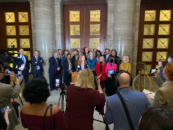When Missouri decided to expand Medicaid last year under Amendment 2, it voted, like many states, for a program it couldn’t afford.
House lawmakers recognized the tremendous spending spree that would have been required for Medicaid expansion and shot down HB 20, which would have appropriated funding for the program.
This was a prudent decision. The Amendment 2 ballot initiative did not contain constitutionally required information about the proposal’s cost and funding sources. And what you see with Medicaid expansion is never what you get.
Supporters of expansion assured voters that passing Amendment 2 could save taxpayers $39 million in the first year. They were off by several hundred million.
The program would actually cost, according to the Department of Social Services, $200 million to implement and, according to Foundation for Government Accountability, up to $349 million each year to operate.
When it comes to Medicaid expansion, the sticker price is always lower than the actual price. We’ve seen this many times before in every state that has tried it.
Expansion costs taxpayers, on average, 157 percent more than initially estimated. That isn’t a small error. It’s the sort of miscalculation that could leave states wondering whether they voted for a different program entirely.
Unfortunately, it’s a price tag that’s in line with current trends. Medicaid spending more than doubled between 2000 and 2013, and the Affordable Care Act (ACA) further accelerated that spending.
Indeed, before the ACA, states spent $1 out of every $4 on Medicaid. Today, one-third of their dollars go toward the program.
States have consistently underestimated the number of able-bodied adults who would enroll in the program. California predicted that expansion would cost $11.6 billion, but the actual cost was $43.7 billion.
That’s an overrun of nearly 280 percent.
The state also estimated that only 910,000 able-bodied adults would enroll during the first two and a half years of operation. By July 2017, enrollment exceeded 3.8 million.
But there are other problems with expansion. Medicaid — important to remember, but evidently easy to forget — is a program intended to help low-income Americans and those with disabilities. Enrolling more able-bodied adults crowds out services for those who need it most.
The radical expansion of the program also tends to displace dollars that would otherwise go to important state priorities such as education, public safety, and transportation — and it would do so without improving health care outcomes.
One study found that every per capita $1 increase in Medicaid spending reduces per-pupil higher-education funding by $2.44. The program has been, the author found, “the single biggest contributor to the decline in higher-education support at the state and local level.”
To make matters worse, the program has been historically rife with fraud and abuse. A recent audit conducted by the federal Office of Inspector General discovered that as many as one-in-five Medicaid dollars were improperly spent on individuals who do not qualify for the program.
In late 2020, the Centers for Medicare and Medicaid Services came to a similar conclusion. They found that the program’s improper payment rate exceeded 21 percent.
Missouri should reject funding Medicaid expansion, not simply because the policy would be an expensive and wasteful boondoggle, or because the program would not result in better health outcomes, but because there are better ways to increase access to affordable care.
Lawmakers could pass SB 41 and SB 584 which would remove onerous restrictions on the ability of advanced practice registered nurses to provide care to Missourians. They could also pass HB 495, a bill that would expand telehealth services, something that would be extremely beneficial for rural Missourians or those who have difficulty leaving their homes.
Additionally, legislators should repeal our certificate-of-need laws — which restrict the supply of health care — by passing HB 1222. And lawmakers at the federal and state level could directly fund tax-free health savings accounts for individuals who need assistance.
In the meantime, lawmakers should be commended for rejecting a massive spending spree for Medicaid. We’ve seen the disastrous results of this policy in other states. It’s not worth replicating here.

Jeremy Cady is state director of Americans for Prosperity-Missouri.









